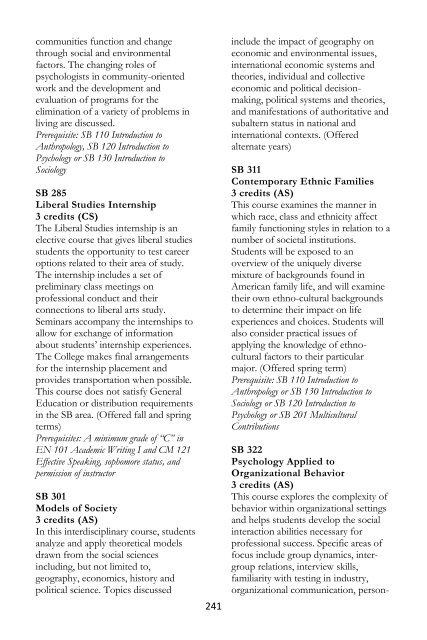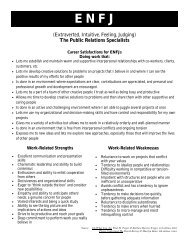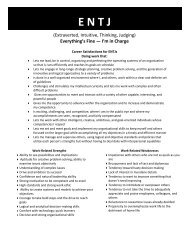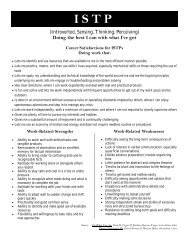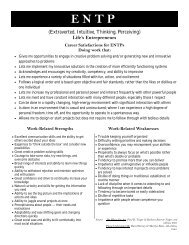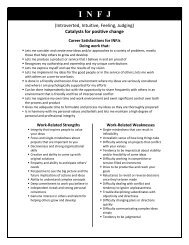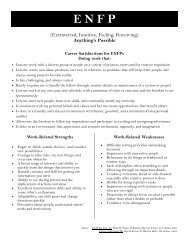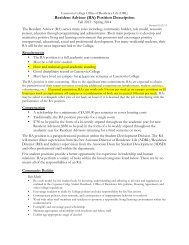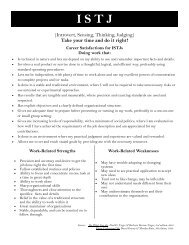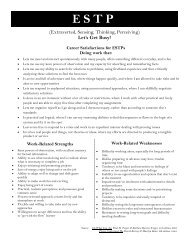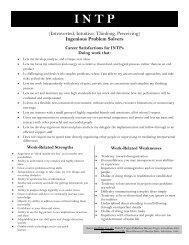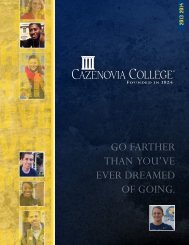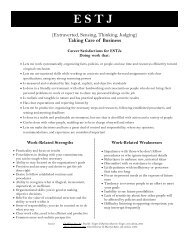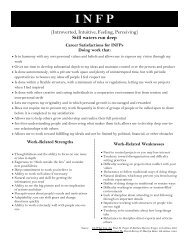Named one of “America’s Best Colleges” by U.S News & World Report
2011-12 Academic Catalog - Cazenovia College
2011-12 Academic Catalog - Cazenovia College
- No tags were found...
Create successful ePaper yourself
Turn your PDF publications into a flip-book with our unique Google optimized e-Paper software.
communities function and change<br />
through social and environmental<br />
factors. The changing roles <strong>of</strong><br />
psychologists in community-oriented<br />
work and the development and<br />
evaluation <strong>of</strong> programs for the<br />
elimination <strong>of</strong> a variety <strong>of</strong> problems in<br />
living are discussed.<br />
Prerequisite: SB 110 Introduction to<br />
Anthropology, SB 120 Introduction to<br />
Psychology or SB 130 Introduction to<br />
Sociology<br />
SB 285<br />
Liberal Studies Internship<br />
3 credits (CS)<br />
The Liberal Studies internship is an<br />
elective course that gives liberal studies<br />
students the opportunity to test career<br />
options related to their area <strong>of</strong> study.<br />
The internship includes a set <strong>of</strong><br />
preliminary class meetings on<br />
pr<strong>of</strong>essional conduct and their<br />
connections to liberal arts study.<br />
Seminars accompany the internships to<br />
allow for exchange <strong>of</strong> information<br />
about students‘ internship experiences.<br />
The College makes final arrangements<br />
for the internship placement and<br />
provides transportation when possible.<br />
This course does not satisfy General<br />
Education or distribution requirements<br />
in the SB area. (Offered fall and spring<br />
terms)<br />
Prerequisites: A minimum grade <strong>of</strong> “C” in<br />
EN 101 Academic Writing I and CM 121<br />
Effective Speaking, sophomore status, and<br />
permission <strong>of</strong> instructor<br />
SB 301<br />
Models <strong>of</strong> Society<br />
3 credits (AS)<br />
In this interdisciplinary course, students<br />
analyze and apply theoretical models<br />
drawn from the social sciences<br />
including, but not limited to,<br />
geography, economics, history and<br />
political science. Topics discussed<br />
241<br />
include the impact <strong>of</strong> geography on<br />
economic and environmental issues,<br />
international economic systems and<br />
theories, individual and collective<br />
economic and political decisionmaking,<br />
political systems and theories,<br />
and manifestations <strong>of</strong> authoritative and<br />
subaltern status in national and<br />
international contexts. (Offered<br />
alternate years)<br />
SB 311<br />
Contemporary Ethnic Families<br />
3 credits (AS)<br />
This course examines the manner in<br />
which race, class and ethnicity affect<br />
family functioning styles in relation to a<br />
number <strong>of</strong> societal institutions.<br />
Students will be exposed to an<br />
overview <strong>of</strong> the uniquely diverse<br />
mixture <strong>of</strong> backgrounds found in<br />
American family life, and will examine<br />
their own ethno-cultural backgrounds<br />
to determine their impact on life<br />
experiences and choices. Students will<br />
also consider practical issues <strong>of</strong><br />
applying the knowledge <strong>of</strong> ethnocultural<br />
factors to their particular<br />
major. (Offered spring term)<br />
Prerequisite: SB 110 Introduction to<br />
Anthropology or SB 130 Introduction to<br />
Sociology or SB 120 Introduction to<br />
Psychology or SB 201 Multicultural<br />
Contributions<br />
SB 322<br />
Psychology Applied to<br />
Organizational Behavior<br />
3 credits (AS)<br />
This course explores the complexity <strong>of</strong><br />
behavior within organizational settings<br />
and helps students develop the social<br />
interaction abilities necessary for<br />
pr<strong>of</strong>essional success. Specific areas <strong>of</strong><br />
focus include group dynamics, intergroup<br />
relations, interview skills,<br />
familiarity with testing in industry,<br />
organizational communication, person-


